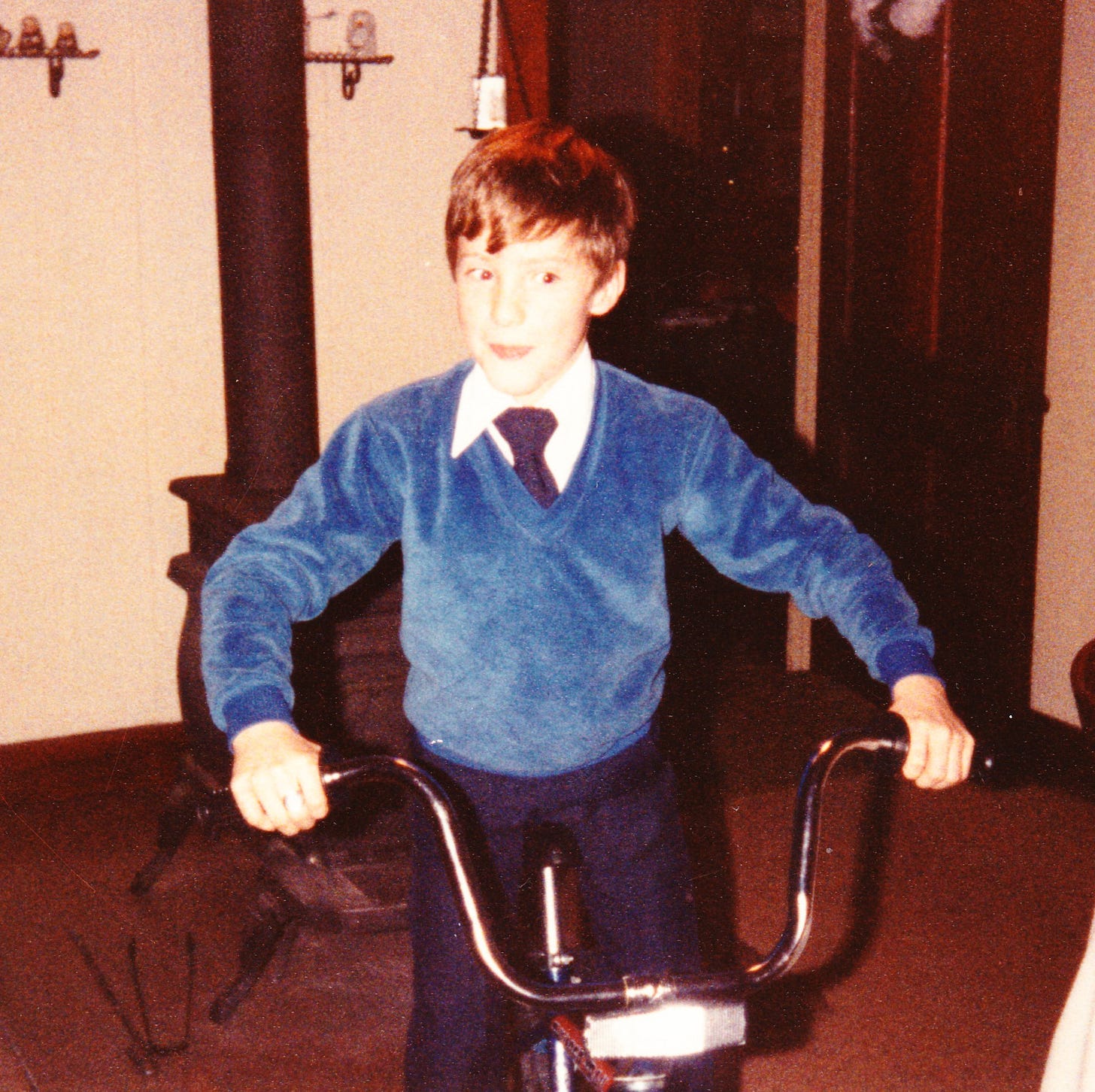The Soundtrack of My Adolescence
There is No Cast for a Broken Spirit

“What’s up, faggot? Faggot. Faggot. Dickhead. Faggot. Faggot. Dickhead. What’s up, dickhead? Dickhead. Faggot. Dickhead. Faggot. Dickhead. Dickhead. Faggot. Faggot. Faggot. Faggot. What’s up, faggot? Faggot. Faggot. Faggot. Faggot. Faggot. Faggot. Dickhead. Dickhead. Faggot. Faggot. Faggot. Faggot. Faggot. Faggot. Faggot. Faggot. Faggot. Faggot. Faggot. Faggot. Faggot. . .”
Stop reading. Close your eyes for a few seconds. Identify the sensations in your body. Feel them, and stay there for a moment. Then, come back . . .
Maybe your heart aches a little. Maybe you feel sick to your stomach. Maybe your head hurts, trying to process this barrage of insults. Verbal violence.
It hurts, even to see these words. Yet, read that paragraph aloud, and you’ll have replicated the soundtrack of my adolescence. I’m not kidding.
If my older brother only called me faggot or dickhead three times a day for three years, he would have called me faggot or dickhead 3,285 times. Every time he walked in or out the front door, every time we passed each other in the hall, assuming my parents wouldn’t hear, any time I was the only person within earshot, he called me faggot or dickhead. Three times a day for three years is a modest estimate.
Penning the words was like squeezing pus from some psychic abscess, that fears light, and hides from the lance in the deepest recesses of my heart.
Anguish. That’s what I feel when I read it.
I feel the anguish the young version of me lived in every day. It’s enough to not only summon tears and return that familiar ache to the pit of my chest. Feeling just a hint of it now, thirty-plus years later, my heart breaks for that kid, and I marvel at his ability to survive such a thing.
He would go on to grow up, and quickly descend into alcoholism. By age 23, he nearly drank himself to death. But, he didn’t. And, when it came time for him to get help, everyone around him knew. He had to get away from his older brother, who, himself, had a drinking problem.
Writing this, I Googled the word, faggot, and quickly found the following definition. “Faggot, often shortened to fag, is a usually pejorative term used to refer to gay men. In American youth culture around the turn of the 21st century, its meaning extended as a broader reaching insult more related to masculinity and group power structure.”
Shame. Setting aside the literal meaning of the word, my brother hurled shame at me. Because, whether or not I knew what it meant to be a faggot, or to be gay, I knew it was unacceptable.
I looked up to my older brother. That’s what made the shame stick. I looked up to my older brother because that’s what little brothers do.
A few years ago, I was meeting with a client for the first time. By then, I had been an addiction professional for more than 20 years. Before I ever sat across from this kid, who was about the same age I was when I first met with someone in a role like mine, I had heard how sad and hurt he was.
I asked him what brought him there – there being a transitional living facility, where men live for a minimum of six months after they complete a stay in rehab. He told a story that was a lot like mine. He drank like I did. He was well-liked in his community. He knew how to be a good employee. And, he had an older brother who treated him like garbage.
I knew what it was like to love and admire an older brother who doesn’t know how to love you back. I knew what it was like to make excuses for him, because I didn’t want to hate him. Because he was my brother. I knew how it felt to keep going back to an empty well, over and over, and to get hurt all over again. I knew how disheartening it felt to watch my big brother treat everyone else much better than he ever treated me. I knew what it meant to be beaten down, verbally and emotionally, by one of the people who was supposed to build me up.
A therapist once asked me if there was an image that represents what all this felt like. I didn’t even have to think about it. It was like, after beating me to the ground, he held me down, pinning me by the throat with the heel of his work boot. I could hardly breathe all those years.
I listened to this young guy, who had lived in an alcoholic haze, but was just someone trying to free himself from the same kind of stranglehold. I sat with him and I heard him. I can’t say I’ve ever felt more sure I was supposed to be in a particular place, at a specific time.
In moments like this, I have the opportunity to be the man I needed when I was that kid’s age.
It helps me make sense of having a jerk for an older brother, and even makes me feel a tiny bit grateful for it.
“I bet part of you wants to beat him with a baseball bat, but you also want to be just like him,” I said. He lifted his gaze from the floor, looked into my eyes, and nodded. I could see his surprise. No one had ever really gotten it before.
He asked me how I knew that, and I told him. That’s what I wanted to do to my brother. I fantasized about it, walking into his bedroom in the middle of the night, and beating him with a wooden baseball bat. It had a ring of bright red paint, about an inch wide, separating the barrel from the handle that I clinched so hard within my fists. I could see myself. I gritted my teeth. I felt the clinch of my jaw whenever I envisioned it. I knew I’d land the first blow to his left shoulder, and then let loose, watching for the look of terror and powerlessness in his eyes when he first opened them.
“It’s okay,” I said. “I know it’s confusing. He’s one of the people in this world who is supposed to love you the most, but he treats you worse than he would treat a stranger.” Under the circumstances, I told him, it was normal to love someone and hate them at the same time. I told him there was nothing wrong with him for feeling this way.
Here’s the thing about having an emotionally abusive older brother. He’s not only the person who calls you faggot or dickhead 3,285 times over the span of three years. He’s also the one who buys you your first bicycle for Christmas. So, you love him and hate him at the same time, and you think something’s wrong with you because of it.
He doesn’t know how to love you. But, as pathetic and cruel as he is, you know, nevertheless. He loves you. And, it’s maddening.
He’s not only the big brother who talks down to you. He’s the big brother who brags about you behind your back. Never in your presence. He’s not only the one who hurls insults at you and makes jokes about you in a room full of people. He’s the guy who makes everyone laugh when he’s doing it. At your expense. So, while you admire him, you also resent him, and you daydream about beating him to a pulp in the middle of the night.
All I ever wanted was to love him. I just wanted a brother. Now, decades later, after more hours than a person should ever have to spend in a therapist’s office, I get it. To pursue a “normal” relationship with this brother means forfeiting my dignity. That’s what I did. And, for that, I didn’t really hate him, as one might assume. I hated myself.
That’s what resulted from being called a dickhead and a faggot thousands of times, and from all the other things he said and did to me. Self-hatred. Whether or not there’s a genetic component to alcoholism, that’s the reason I drank the way I did – because I hated myself. I think that’s why my client, another little brother, and a beautiful human being, drank the way he did. Because he hated himself.
I feel proud for not going back to the empty well anymore; for not hating myself anymore. It would be nice to have my brother in my life, but I won’t do it at the expense of my own dignity. Yes, he may still be my brother. He’s my flesh and blood. But, family or not, I won’t be in a relationship with anyone unless there is room for me to exist in it. Neither will that former client. And, neither should you.
For those who take issue with the concept of toxic masculinity, my brother’s behavior was exactly what the American Psychological Association (APA) was talking about. He wasn’t just verbally abusing me; he was asserting dominance over me.
If you were only there now and then to hear him call me a dickhead, you probably chuckled. You might have thought of it as harmless teasing. Maybe you said something like, “he’s just being a big brother,” or, “that’s what big brothers do.” It’s part of the whole “boys will be boys” trope.
Some people say the APA is calling masculinity itself toxic. But, they’re not asking you to stop being a man. They’re asking you to stop being an asshole. They’re asking you to stop being a bully. They’re telling you to stop being someone’s shitty older brother.
Every time I talk to that kid, I tell him I love him, like his brother should have told him and my brother should have told me. That’s what a kid needs to hear 3,285 times. It’s why every time I talk to my son, I tell him I love him, and it’s why I say the same to my buddies, just about every time I talk to them.
Words can create or destroy. That old aphorism, about how they will never hurt you – whoever first said it was wrong. You can pretend words don’t hurt, as it suggests, but the ones like those I heard constantly from my older brother will burrow into your heart like that abscess, and the infection will remain until you treat it. And, until then, one way or another, you will spread it.
Words may not break your bones, as will sticks and stones. But, they are even more powerful; powerful enough to break you.




Thanks for having the courage to share your story Tom. My heart breaks for that boy. I’m so proud to call you a friend and admire your passion for helping men heal their hearts so we might more fully show up in our relationships and create a new legacy.
Loved the explanation and felt the hurt, I am the older brother, not a great one and I on occasion treated my younger brothers like shit growing up, however I also express the love I feel for them, and they also towards me, it feels much better than the hurt.